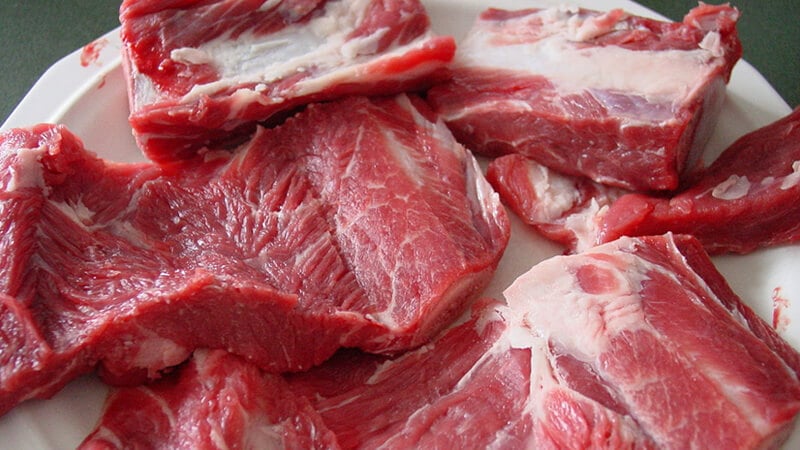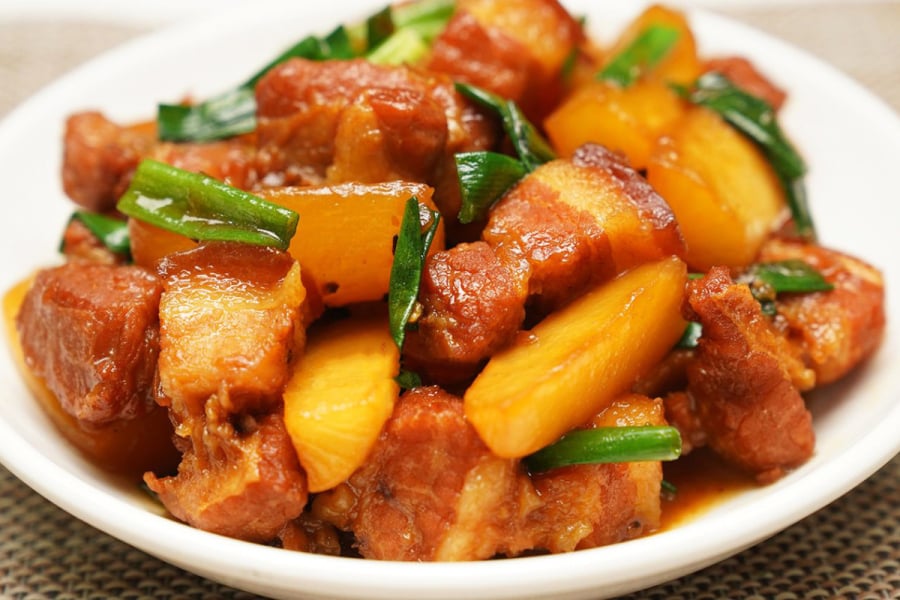Pork has long been an integral part of the daily diet for many Vietnamese families. With its delicious flavor, ease of preparation, and high nutritional value, pork is a great source of protein, vitamins, and minerals for the body. However, excessive pork consumption can also lead to serious health consequences. So, how can we balance the benefits and risks associated with eating pork? Let’s explore this in the article below.
Nutritional Value of Pork
According to research by the National Institute of Nutrition of Vietnam, pork contains many essential nutrients. In 100 grams of lean pork, you can get about 26 grams of protein, rich in essential amino acids that help build and maintain muscle mass. In addition, pork provides B-complex vitamins such as B1, B6, and B12 – the “heroes” that support energy metabolism and boost immunity. Not only that, but pork is also a source of minerals such as iron, zinc, and selenium, especially beneficial for pregnant women and the elderly.
With its rich nutritional profile, pork plays an important role in the diets of many people. However, this does not mean that we can consume pork indiscriminately. Let’s take a closer look at the benefits and risks of pork consumption.

Benefits of Eating Pork
- Provides Muscle-Building Protein
The protein in pork is easily absorbable, aiding the body in muscle recovery and growth after workouts or strenuous labor. This is especially beneficial for those engaging in gym routines or aiming to improve their physique.
- Essential Source of Vitamins and Minerals
Vitamin B12 in pork contributes to red blood cell production and maintains brain function. Iron and zinc boost immunity, reduce fatigue, and prevent anemia. These nutrients are particularly crucial for women, who are more prone to nutritional deficiencies.
- Energy Source
Pork contains a moderate amount of fat, providing the body with energy to function throughout the day. It’s an excellent choice for those who need to consume extra calories to maintain their health.
Drawbacks of Excessive Pork Consumption
Despite its nutritional benefits, consuming too much pork can lead to significant health risks:
- Increased Cholesterol and Cardiovascular Risk
According to PGS.TS Nguyen Thi Lam, former Vice Director of the National Institute of Nutrition, excessive consumption of pork, especially fatty portions, can elevate levels of harmful LDL cholesterol in the blood, increasing the risk of cardiovascular disease and stroke.
- Cancer Risk
A study published in Tuoi Tre newspaper revealed that a high intake of processed red meat, including pork products like sausages and salami, may increase the risk of colorectal cancer. The presence of nitrates and nitrites in processed meat is a primary cause for concern in this regard.
- Strained Digestive System
Overindulging in pork can overwhelm the digestive system, leading to indigestion, bloating, and even prolonged digestive disorders.
- Weight Gain and Obesity
The high-calorie content of pork, particularly the fat, can easily lead to weight gain if intake is not carefully monitored.

How to Eat Pork in a Healthy Way
The potential risks do not mean we have to give up pork entirely. Instead, adopt the following strategies to enjoy the benefits while maintaining good health:
- Opt for Lean Cuts
Instead of choosing fatty cuts like bacon or pork belly, prioritize leaner options such as tenderloin, loin, or shoulder. These cuts contain less fat and offer a higher protein content.
- Cook Pork Appropriately
Minimize deep-frying or pan-frying, as these methods increase the fat content. Opt for boiling, steaming, or grilling to retain flavor without compromising your health.
- Combine Pork with Green Vegetables and Other Foods
When preparing meals, don’t forget to include plenty of green vegetables and fruits to balance your nutrition. For instance, a pumpkin soup with pork is not only delicious but also rich in vitamins.
- Control Portion Sizes
Aim for a consumption of around 100-150 grams of pork per meal. Complement it with carbohydrate-rich and fiber-rich foods to create a harmonious meal.
Pork is a nutrient-dense food, playing a significant role in our daily diets. However, excessive consumption can have negative impacts on health, ranging from elevated cholesterol levels to an increased risk of cancer. Thus, to maximize the benefits of pork, we need to be mindful of our choices, preparation methods, and portion sizes.


































